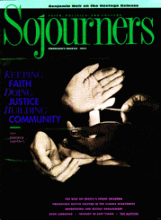The list of movies in which God serves as a co-star could fill a book. The genre is well-defined and the plots usually follow well-worn grooves. God is commonly portrayed as a favorite indulgent uncle rather than as creator and judge; it's hard, after all, to imagine George Burns meting out damnation to unrepentant sinners. And while the existence of heaven (if not hell) is usually assumed, the process of spiritual growth that qualifies one for admittance turns out to be nothing more than middle-class good manners.
But writer/director Michael Tolkin's newly released movie The Rapture eschews the gauzy pinks of the usual Hollywood treatment of these themes for what he describes as "theological film noir." Sharon (played by Mimi Rogers), a Los Angeles long-distance telephone operator, slakes her life's tedium with casual sexual encounters.
Then one day she overhears co-workers mysteriously but reverently talking about the "child" and the "pearl." These obviously religious terms resonate when two door-to-door evangelists attempt to convert her. Deeply depressed, Sharon makes a half-hearted suicide attempt, resulting precipitously in her acceptance of salvation.
Sharon tracks down Randy (David Duchovny), the one sexual partner for whom she had any feeling, and converts him to her ill-defined brand of fundamentalism. It is a faith that seems mostly doctrine-free; it is practiced at gatherings more suggestive of 12-step meetings than worship services.
Read the Full Article

